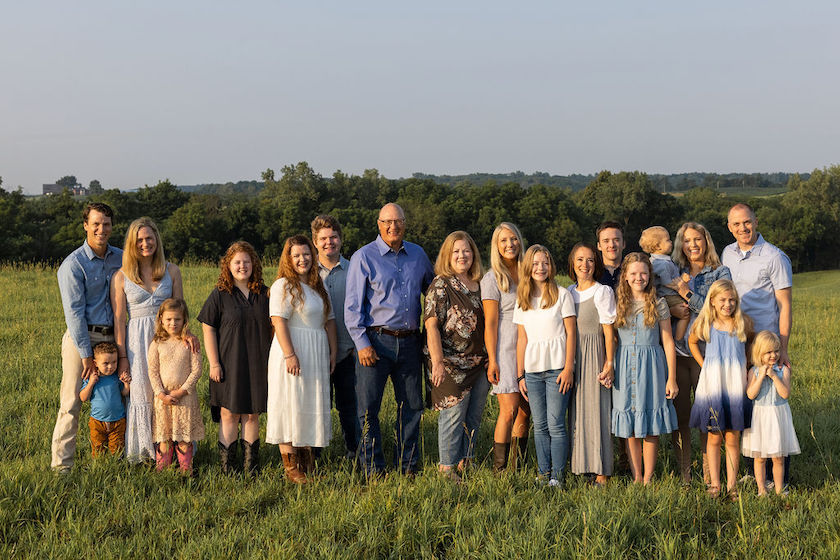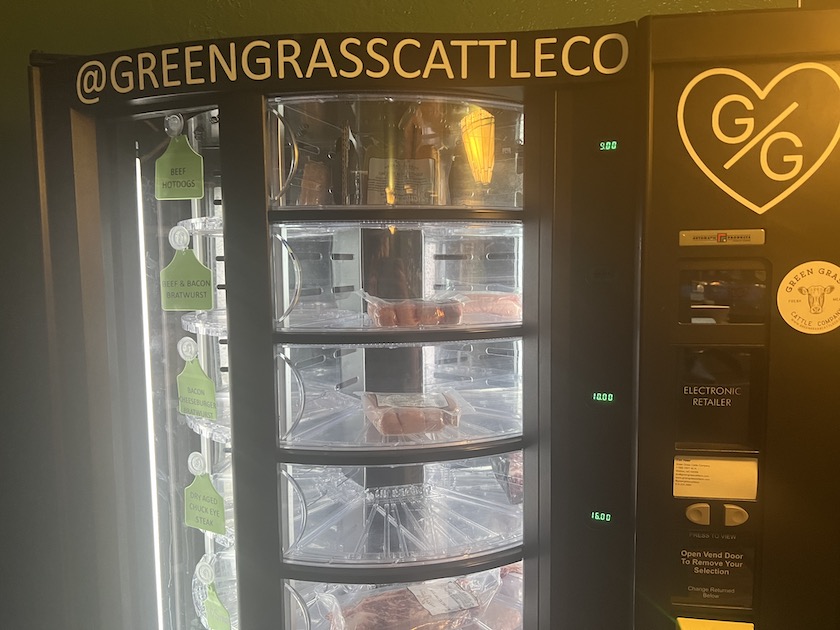Carving Out Convenience: Young Cattle Producer Serves Up Success With Vending Machine of Meat
Green Grass Cattle Co USFR Feature
Walk into the Green Grass Cattle Company & Mercantile in Weston, Mo., and you’re immediately greeted with a slice of nostalgia. From a recently acquired feed store, to a storefront featuring beef, home goods and apparel, it’s a family-run business with solid rural roots.
“I'm the fifth generation in my family to take this on,” says Tim Haer, when asked how long his family has been farming.
He may be a fifth-generation farmer, but he’s now part of what’s become first-generation beef business.
“Green Grass Cattle Company started two years ago,” says Haer.
When we caught up with Haer, he took us out to one of his family’s pastures.

After the flood of 1993, the family sold their farm and cattle. Tim’s mom and dad then landed jobs off the farm, but still within agriculture. The family had some cattle, but after his dad retired, he was ready for a new family venture.
“He kind of approached us and said, ‘Hey, you guys want to make a run at this full time?' And after that, we started adding back to the herd and increasing our numbers,” says Haer.
Intentional Decisions and Growth
It’s growth that hasn’t always happened by chance. While Haer says some of the relationships and business partnerships have been a fortunate find, the Haers are also intentional in everything they do.
“When we first started out, we were just selling sides of beef. We didn't have a retail store. We had a small online presence. But we didn't have an e-commerce site or anything,” he says.
But when the Covid-19 pandemic hit, just like many protein producers, the Haer saw demand for freezer beef catch fire, and that’s when the Haers knew it was time to dish out something new.
“We looked at that as an opportunity to start processing cattle at a USDA [inspected] facility, and then selling individual cuts of beef as well,” he says.
Serving Up a Story
And they did, opening up a storefront in Weston in September 2021. The family knew opening a new door would also serve as a way for the family to connect with consumers and share the story behind their beef.
“I think it's really important to do that,” says Megan Haer-Schmidt, Tim’s younger sister, but also manager of New Deal Ag Solutions, the family’s newest business. “I think consumers care about it, too. The types of questions that we will get are often very detailed, and you can tell that people, you know, want to know that the food that they're eating was raised by a local family, or that it was cared for.”
High-Quality Beef Starts with High-Quality Bulls
Differentiating their business has become Green Grass Cattle Company’s specialty, and Haer says it all starts with high-quality bulls. The family carefully selected the bulls for certain traits.
“We weren't concerned about a lot of the other things that traditional producers are looking for. What we were looking for, were bulls that had high EPD (expected progeny differences) scores and ribeye size and marbling," Haer explains.
The other trait the Haers wanted, were finding bulls that were extremely docile, and they seemed to hit the jackpot when they found black angus bulls from Connealy Angus in Whitman, Neb.
“We found great value in buying those, and it's turned out to be a pretty successful venture for us,” says Haer.
A Wild Idea That Turned Wildly Successful
The deliberate decisions made at Green Grass Cattle Company are also ones that can be a bit different, especially when it comes to some of Tim’s off-the-wall ideas.
“Last year, I had a buddy of mine that moved to Germany and I was talking to him one evening, and he goes, ‘Man, you're not going to believe this, but I get my bratwurst out of a vending machine that's two blocks away from me.’”
With that, he had an idea: create their own vending machine full of meat.
“I researched the different machines that were available to see how I could make it work to sell not just brats, but ground beef and even steaks,” says Haer. “And I finally found a machine that I thought would work and accommodate our needs.”

Haer didn’t just do some heavy research on the right set-up to service customers, but also the right location.
“Keith Bradley, co-owner of Made in KC, really believed in our idea. He's really supported us through this whole venture,” says Haer. “And they've got a lot of runway. I think they have close to 15 stores in Kansas City."
That idea, is a reality today, located inside Front Range Coffeehouse, which is one of Bradley’s businesses in the middle of Kansas City, and 40 miles from the Haer family’s farm.
“It's just kind of taken off, and it's been wildly successful,” says Haer.
Digesting the Data
With the vending machine being located 40 miles from the farm, Haer knew he needed a vending machine that was highly automated. And what the Haers landed on is a machine that allows Tim to constantly collect the data.
“In working with the distributor that sells the machines, we were able to find a card reader that actually provides a lot of telematics in real-time,” says Her.
Out of all the aggregated data, Haer says the most telling point may be how people will buy steak at any hour of the day. When the vending machine first launched, it was located outside the store, and Haer says people would buy steaks all times of the day and night, including 11 p.m.
“I didn't know if the machine was going to be successful to start with. When people were buying, buying steaks that late at night, it just kind of validated all the assumptions that I had,” says Haer.
Loyal Customers, One Steak at a Time
The reviews of Green Grass Cattle Company tell the story best. They’ve carved out convenience, while attracting a loyal customer base across the Kansas City area.
“When we first opened up the doors to the store, we were answering questions we just kind of took for granted as knowledge that we had our whole lives,” he says. “We're not just trying to provide locally raised beef to consumers, we also have an obligation now to educate them and make more of a connection with where our food comes from.”
Whether it’s buying a steak from this vending machine, or visiting the family's store and mercantile, the Haers have not only carved out convenience, but also a niche.







